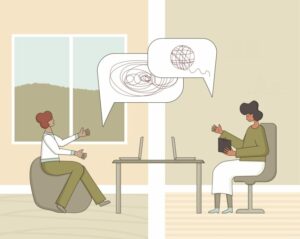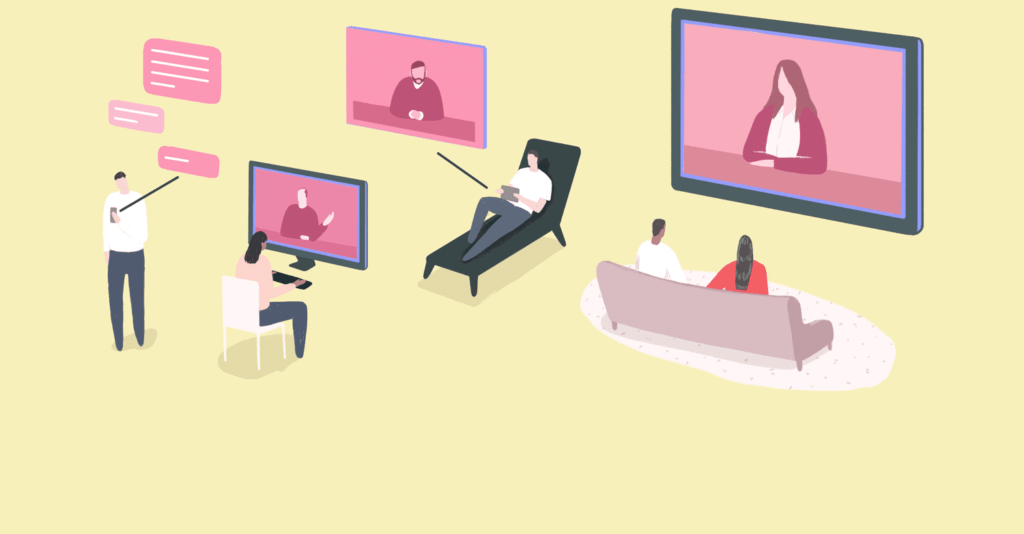The world has been rapidly transitioning to a digital era, where everything from work to education and even counseling is now being offered remotely. Remote counseling, also known as tele-counseling or e-counseling, is a form of counseling where the therapist and the client communicate virtually through video or phone calls, chat, or email. The increasing popularity of remote counseling can be attributed to its convenience, accessibility, and affordability. In this article, we will explore the benefits of remote counseling and how it is changing the landscape of traditional counseling.
Contents
What is Remote Counseling?

Remote counseling, also known as tele-counseling or e-counseling, is a form of counseling where the therapist and the client communicate virtually through video or phone calls, chat, or email. The therapist and client can interact from any location, as long as they have access to a stable internet connection and a device such as a computer, tablet, or smartphone. Remote counseling has become increasingly popular due to its convenience, accessibility, and affordability, and it allows individuals to receive support and guidance from mental health professionals without leaving their homes.
Benefits of Remote Counseling
Remote counseling has several benefits, including:
- Increased accessibility: This counseling allows individuals to access mental health services from any location, regardless of geographical barriers. This is particularly beneficial for those living in rural or remote areas, where access to mental health services may be limited.
- Convenience: This counseling eliminates the need to travel to a therapist’s office, which can be time-consuming and costly. Clients can receive counseling from the comfort of their own homes, which may increase their willingness to participate in therapy.
- Cost-effective: This counseling is often less expensive than traditional in-person counseling, as it eliminates the cost of transportation and reduces the therapist’s overhead expenses. This makes counseling more affordable and accessible to a wider range of people.
- Increased privacy: This counseling can be done from the privacy of one’s own home, which may be particularly appealing for those who are uncomfortable with the idea of face-to-face counseling or who have concerns about confidentiality.
- Flexibility: This counseling allows for more flexible scheduling, as clients and therapists can often schedule sessions at times that are convenient for them.
Remote Counseling vs. Traditional Counseling: How They Differ?

- Physical presence: Traditional counseling involves face-to-face interaction between the therapist and the client, while remote counseling is conducted virtually, typically through video or phone calls, chat, or email.
- Environment: In traditional counseling, the client visits the therapist’s office, while in remote counseling, the client can receive counseling from any location with internet access.
- Nonverbal cues: Traditional counseling allows for nonverbal communication, such as facial expressions, body language, and tone of voice, which can be important in understanding the client’s emotions and reactions. Remote counseling may limit the ability to pick up on these nonverbal cues.
- Technology: Remote counseling requires access to technology, such as a computer, smartphone, or tablet, which may be a barrier for some individuals. Additionally, technical issues, such as poor internet connection or malfunctioning equipment, may interfere with the counseling session.
- Therapist qualifications: When seeking counseling services, it is important to ensure that the therapist is qualified and licensed to provide mental health services in the client’s state or country. With remote counseling, there may be differences in licensing and regulations between different states or countries, which can impact the therapist’s ability to provide services to clients located in different locations.
Overcoming The Challenges of Remote Counseling
- Technical difficulties: Technical issues, such as poor internet connection or malfunctioning equipment, can interfere with the counseling session. To overcome this challenge, clients and therapists should ensure that they have a stable internet connection and access to reliable equipment before the session.
- Privacy and confidentiality: This counseling requires a private and confidential environment, which can be challenging if the client lives in a shared space or if the therapist is working from a public location. To ensure privacy and confidentiality, clients and therapists should find a quiet and private space to conduct the session, use secure communication methods, and establish clear boundaries and expectations around privacy and confidentiality.
- Building rapport: Building a strong therapeutic relationship is essential for the success of counseling, and this can be challenging in remote counseling, where nonverbal cues may be limited. To build rapport, clients and therapists can use video calls to facilitate visual communication, establish clear expectations and goals for the session, and actively listen to each other to promote empathy and understanding.
- Accessibility: While this counseling can increase accessibility for many people, it may also present accessibility challenges for those with disabilities or limited access to technology. To overcome this challenge, therapists can provide accommodations, such as closed captioning or sign language interpretation, and offer alternative communication methods, such as phone calls or email, for clients who may not have access to video conferencing technology.
By addressing these challenges, clients and therapists can work together to create a successful and effective counseling experience.
How To Find a Remote Counselor?

Finding a remote counselor can be done in several ways. Here are some options to consider:
- Online directories: Many online directories, such as MantraCare or Therapymantra, have filters that allow you to search for therapists who offer these counseling services. These directories often provide detailed profiles of therapists, including their specialties, qualifications, and fees.
- Referrals: Ask friends, family members, or healthcare providers for referrals to remote counselors they trust. You can also contact your insurance provider or employee assistance program to see if they offer these counseling services or have a list of recommended providers.
- Professional organizations: Many professional counseling organizations, such as the American Counseling Association, have directories of licensed counselors who offer these counseling services. These directories can be searched by location, specialty, and other criteria.
- Online therapy platforms: There are several online therapy platforms, such as BetterHelp, Talkspace, and Amwell, that offer remote counseling services with licensed therapists. These platforms typically require you to sign up and pay a fee for their services, but they can be a convenient option for finding a remote counselor quickly.
- Search engines: Conduct a search engine search using keywords such as “remote counselor” or “tele-counseling” along with your location to find counselors who offer these counseling services in your area.
Conclusion
Remote counseling, also known as tele-counseling or e-counseling, is a growing trend in mental health care that allows clients to receive counseling services through virtual means such as video or phone calls, chat, or email.
As technology continues to advance, remote counseling will likely become even more accessible and user-friendly in the future, while mental health professionals and their clients will need to address the limitations and challenges associated with this form of counseling to ensure its effectiveness and success.


